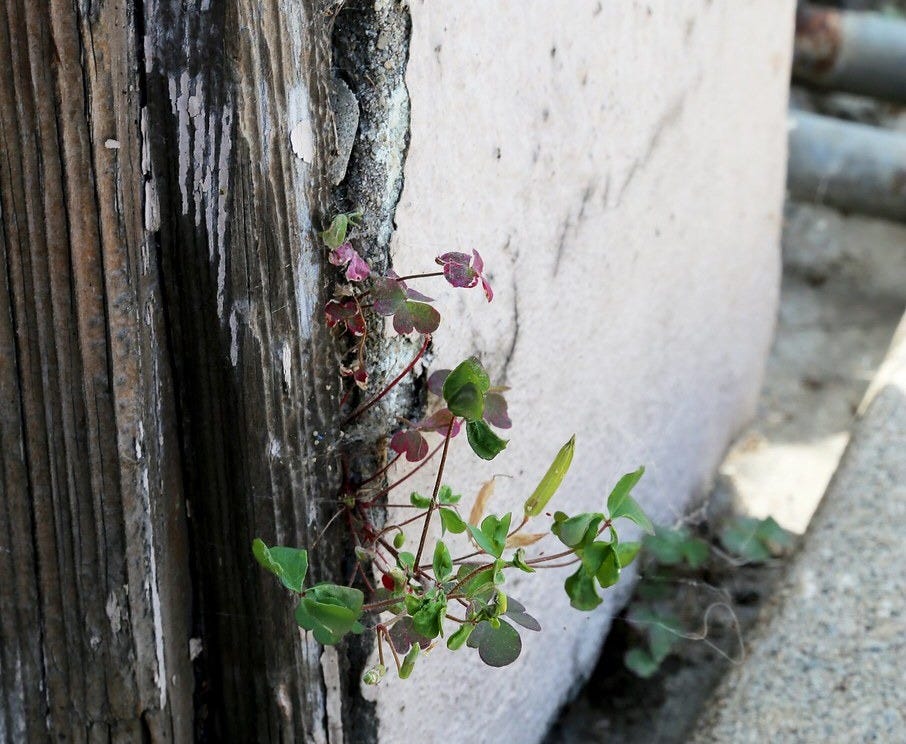Collapse Letters: Helping Nature Rest
Nature is quick to reclaim lost civilizations, but it's fun to help it along anyway.
A neighbor finally asked why I was doing it. I was wondering when someone would work up the courage to ask instead of staring while walking by.
Reclaiming this city feels as weird as it probably looks, and I didn’t have an answer beyond the obvious, “destroying stuff”.
I told him I think the first one was my neighbor’s ADU. He had been building that thing for over a year, arguing back and forth with the city for permits on this or that. It wasn’t that big, but it was hideous. I guess the construction crew was using his lot for storage or something, because they had some jackhammers, generators, things like that scattered in the backyard. Even a small backhoe thing.
While everything was going south, some people moved into that ADU. My neighbor had left early on and they showed up a few days later. I don’t know why they chose the ADU over the front house. I was wary at first, but they minded their own business. People weren’t as aggressive as I thought they would be. They didn’t do much, just stayed inside. At some point, they must have left because I stopped seeing them going about.
My generator ran out of gas, so I went over to see if there was any there I could siphon. But then I saw all of the tools just lying there. It just entered my mind that no one would miss this house, and if it stood, then it might invite others that weren’t so chill as the last squatters. So I picked up the sledgehammer and just had at it. Smashed the drywall and the finishings. Took down the facade. I just kept swinging until my arms were tired, but progress was slow. Then I got in the backhoe and tore down the rest.
After the place came down, it was weirdly better. Yeah, it was dusty, but the sunlight actually reached the yard. A breeze moved through where rooms used to be. It made the street look a little less dead, even though it was emptier. So I kept going. Over a month, I took out all of the abandoned houses on the block. Nature did its part, too. Tree saplings pushing through gaps in the sidewalk, raccoons building nests, coyotes wandering the night without fear, constant birdsong. I figured I should help them along.
The few families remaining on the block saw and heard me at some point. They didn’t comment. I know some at least had already ransacked the vacant homes before I destroyed them. The people who are still in Monrovia, we don’t ask each other questions. Don’t get me wrong, we’re friendly and all. But we don’t really ask questions like “why are you doing that?” I think people had had enough of butting into each other’s business before things got bad. We’re all doing the best we can with what’s left; we don’t need to create more problems by caring about what so-and-so is doing or why.
That’s why it was so surprising when this guy asked me what I was doing and why.
Now it’s a way to pass the time, really. It got fun when I picked up some stuff at the tool rental shop. I guess looting heavy machinery wasn’t a priority. I usually demolish the buildings that I don’t like first. Some of them are memories, like the liquor store I went to before getting my DUI. Sometimes they’re styles I don’t like, like Victorian trash. Thankfully, there aren’t many of those. Churches.
The hardest part is the asphalt.
Buildings you can pry apart. Wood rots. Concrete cracks with enough pressure. But asphalt clings. It’s like the city itself is trying to maintain its previous importance. But I keep going. Hammer drill, jackhammer, backhoe, repeat. Sometimes I work for a whole afternoon and only break up a few slabs.
The thing is, once it cracks, the earth takes it back pretty fast. Grass pushes through. Even weeds look beautiful now. Nature has patience that we didn’t. I’m just speeding up the process, and it feels good.
The city looks different now. I used to know every street. I used to walk my dog down these blocks. He was a rat terrier, wiry fur, always wagging, even old and slow. He’s buried in the backyard under the jacaranda at my mom’s place. I visit him sometimes.
I think about my mom a lot while I’m working. She was a single parent, always tired, but she made a good home. She would’ve said what I’m doing is “a project,” like something to focus the mind. I think she’d understand. When I was going through her stuff after she died,
Most nights I just sit outside after the sun goes down. No lights. No electricity. But you don’t need it because the stars came back once the city got quiet, and we didn’t need to light the night. Then I wake up and do it all again.
I don’t know how long I’ll keep doing this. There’s no endpoint. Just me, the tools, the sun, and whatever’s left of Monrovia.
It’s strange, but dismantling this place feels like taking care of it. Like giving it back.
Like letting it rest.

